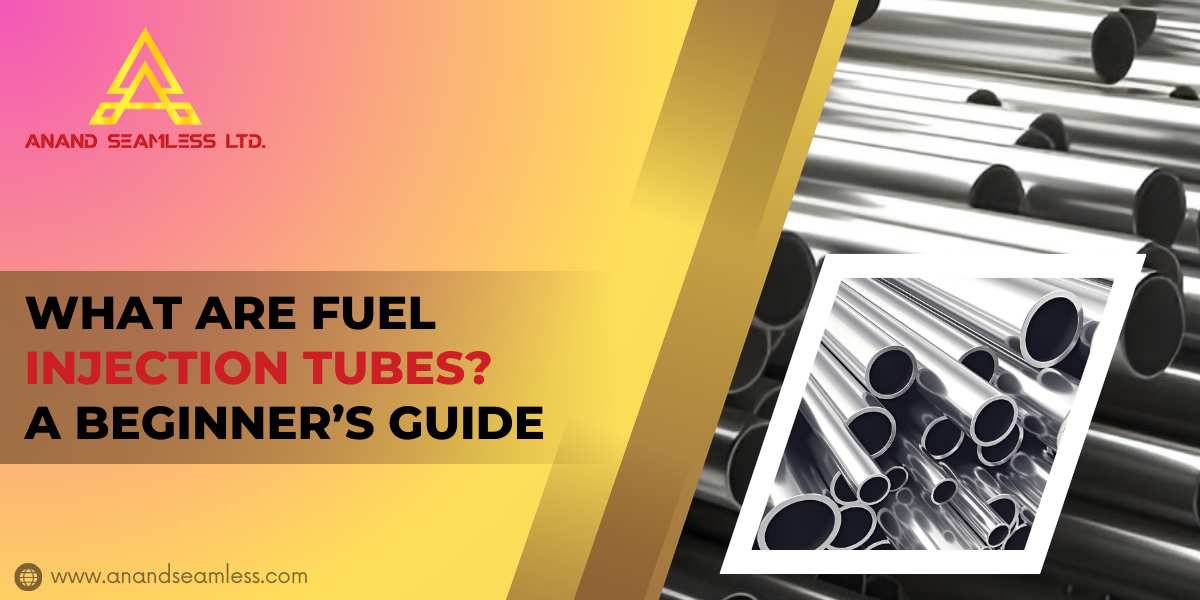Quick Inquiry
Fuel injection systems are a crucial component in modern internal combustion engines. These systems ensure efficient fuel delivery, improve engine performance, and reduce emissions. One of the essential parts of this system is the fuel injection tube, a key element that directly impacts the engine’s overall performance and efficiency.
This guide will provide a beginner-friendly overview of fuel injection tubes, their functions, and their unique features.

What Are Fuel Injection Tubes?
Fuel injection tubes, also known as fuel injection pipes, are specialised components designed to transfer fuel from the injection pump to the engine’s combustion chamber. These tubes operate under high pressure, ensuring the precise delivery of fuel to achieve optimal combustion. Their role is critical in maintaining engine efficiency, fuel economy, and reduced emissions.
Unlike standard fuel lines, fuel injection tubes are engineered to withstand extreme pressure and temperature conditions. They ensure that the right amount of fuel reaches the engine at the right time, aligning with the engine’s operating cycle.
Materials Commonly Used in Manufacturing
Manufacturers of fuel injection tubes utilise materials that can endure the demanding environment of internal combustion engines. Typically, these tubes are made from high-strength seamless tubes to ensure durability and resistance to pressure fluctuations. Seamless tubes are favored due to their uniform structure and absence of welded seams, which makes them less prone to failure.
Read More: The Manufacturing Process of Seamless Tubes
Some commonly used materials include:
- Alloy Steel: Known for its strength and ability to resist high-pressure conditions.
- Stainless Steel: Offers excellent corrosion resistance, which is essential for long-lasting performance.
- Carbon Steel: Provides a cost-effective yet reliable solution for fuel injection pipe manufacturers.
These materials undergo rigorous quality checks to ensure they meet international standards for safety and performance.
How Fuel Injection Tubes Work
Fuel injection tubes function as a conduit for fuel to travel from the injection pump to the engine’s combustion chamber. The injection pump generates high pressure, pushing the fuel through the tubes. The high-pressure environment ensures the fuel is atomised when it enters the combustion chamber, promoting efficient and complete combustion.
The process works as follows:
- Fuel Injection Pump: This component generates the necessary pressure to push the fuel through the system.
- High-Pressure Delivery: The fuel injection tube carries the pressurised fuel without leaks or loss of pressure.
- Precise Timing and Delivery: The design of the fuel injection tubes ensures that fuel is delivered at the right time and in the right amount, matching the engine’s operating cycle.
Properly functioning fuel injection tubes are vital for smooth engine operation and optimal fuel consumption.
Key Features of Fuel Injection Tubes
Fuel injection tubes are distinguished by several key features that make them indispensable in automotive and industrial engines:
- High Pressure Resistance: They can withstand pressures ranging from hundreds to thousands of psi, ensuring safe and efficient fuel delivery.
- Corrosion Resistance: Materials like stainless steel prevent rust and corrosion, even in harsh operating conditions.
- Precision Engineering: Fuel injection pipe manufacturers design these tubes with precise dimensions to ensure a snug fit and seamless fuel flow.
- Durability: Seamless tube construction ensures that the tubes are robust and can endure prolonged exposure to high temperatures and pressures.
- Compliance with Standards: Leading manufacturers adhere to international standards to ensure quality and performance reliability.
These features make fuel injection tubes a critical component for achieving efficient engine performance while minimising environmental impact.
Types of Fuel Injection Tubes
Fuel injection tubes come in various types, each designed to suit specific engine requirements and applications. The main types include:
- Single-Wall Tubes: Lightweight and suitable for lower pressure applications. These tubes are often used in smaller engines where extreme pressure resistance is not required. Their simpler design makes them more cost-effective, but they may not be ideal for heavy-duty applications.
- Double-Wall Tubes: These feature an inner and outer layer for added durability and resistance to high pressures. The dual-layer design helps in preventing fuel leaks even in extreme operating conditions. These tubes are commonly used in large engines or industrial machinery that demands robust performance.
- High-Pressure Tubes: Designed for modern engines requiring extreme pressure tolerance. These tubes are manufactured to handle the highest levels of pressure without compromising on performance. They are ideal for advanced automotive engines and heavy equipment where precision fuel delivery is paramount.
Manufacturers often customise these tubes based on the engine’s specifications, ensuring optimal compatibility and performance for different applications.
Applications of Fuel Injection Tubes
Fuel injection tubes are used in various applications, including:
- Automotive Engines: Essential in passenger cars, trucks, and buses for efficient fuel delivery. They ensure smooth engine performance, better fuel efficiency, and compliance with emission standards. Their durability is critical for long-term use in vehicles operating under diverse conditions.
- Industrial Machinery: Used in heavy machinery, including excavators and generators, to maintain engine reliability. These machines operate in demanding environments, making high-quality fuel injection tubes vital for uninterrupted operations and reduced downtime.
- Marine Engines: Critical in ships and boats for seamless fuel delivery under challenging conditions. Marine engines require tubes that can withstand the corrosive effects of saltwater and constant vibration, making corrosion-resistant materials a necessity.
- Agricultural Equipment: Found in tractors and harvesters to ensure optimal fuel efficiency. In agricultural machinery, these tubes play a significant role in minimising operational costs and maximising productivity during extended periods of use.
These versatile tubes play a significant role in multiple industries, demonstrating their importance in diverse operating environments and highlighting their adaptability.
Contact Us for Customised Tube Solutions!
Why Quality Matters in Fuel Injection Tubes
The quality of fuel injection tubes directly impacts engine performance and longevity. High-quality tubes offer several advantages:
- Enhanced Safety: Reliable tubes minimise the risk of leaks or failures, which can lead to accidents. Safety is especially important in industries like transportation and heavy machinery, where failures can have serious consequences.
- Improved Efficiency: Precision-engineered tubes ensure accurate fuel delivery, maximising engine performance. This not only enhances the power output but also reduces fuel consumption, providing economic and environmental benefits.
- Cost Savings: Durable and long-lasting tubes reduce maintenance and replacement costs over time. High-quality materials and seamless construction ensure that the tubes can handle prolonged use without frequent repairs.
- Environmental Benefits: Quality tubes contribute to lower emissions by promoting efficient combustion. By delivering the right amount of fuel at the right time, they help engines meet stringent emission regulations, reducing their environmental impact.
Maintaining and Replacing Fuel Injection Tubes
Common Signs of Wear and Failure
Fuel injection tubes, like any other engine component, are subject to wear and tear over time. Common signs that indicate the need for maintenance or replacement include:
- Fuel Leaks: Visible fuel leakage around the tubes is a clear sign of damage or wear.
- Reduced Engine Performance: A drop in engine efficiency or power output can signal issues with the fuel delivery system.
- Abnormal Noises: Hissing or other unusual sounds near the fuel injection system may indicate a compromised tube.
- Corrosion or Cracks: Physical inspection revealing rust, cracks, or other deformities necessitates immediate attention.
Ignoring these signs can lead to engine damage, increased emissions, and even safety hazards.
Tips for Proper Maintenance and Installation
Maintaining and installing fuel injection tubes properly can extend their lifespan and ensure optimal performance. Here are some practical tips:
- Regular Inspections: Regularly inspect the tubes for wear, corrosion, or leaks. Early detection helps avoid expensive repairs.
- Use Genuine Parts: Always replace worn-out tubes with high-quality components from trusted fuel injection pipe manufacturers. Genuine parts ensure better compatibility and durability.
- Follow Manufacturer Guidelines: Adhere to the installation and maintenance recommendations provided by the manufacturer. This includes torque specifications and proper handling during installation.
- Avoid Contamination: Ensure that the fuel and tubes are free from contaminants that could block or damage the system.
- Professional Servicing: Engage qualified technicians for installation and servicing to avoid improper handling and ensure precise fitment.
Helpful FAQs
1. What is the lifespan of fuel injection tubes?
The lifespan of fuel injection tubes varies depending on the material, usage conditions, and maintenance. High-quality seamless tubes can last several years if maintained properly.
2. How do I identify a reputable fuel injection pipe manufacturer?
Look for manufacturers with certifications, a proven track record, and positive customer reviews. They should also offer warranty support and comply with international quality standards.
3. Can seamless tubes be used in all fuel injection systems?
Seamless tubes are highly versatile and suitable for most fuel injection systems. However, the specific type of tube should match the engine’s requirements and pressure tolerance.
4. What happens if a fuel injection tube fails?
A failed fuel injection tube can cause fuel leaks, lower engine performance, and higher emissions. Immediate replacement is crucial to prevent further damage.
5. Are stainless steel tubes better than alloy steel tubes?
Both materials have their advantages. Stainless steel offers excellent corrosion resistance, while alloy steel provides superior strength for high-pressure applications. The choice depends on the operating environment and specific engine needs.
Unlock the Power of Fuel Efficiency with Fuel Injection Tubes From Anand Seamless
Are you looking to enhance your engine’s performance and fuel efficiency? Understanding fuel injection tubes is key. These vital components play a significant role in the precise delivery of fuel into your engine’s combustion chamber, ensuring optimal performance and reduced emissions.
At Anand Seamless Limited, a leading tube manufacturer in India, we specialise in producing durable, high-performance fuel injection tubes designed to meet the needs of various industries. Contact us at +91-9099996851 or drop us a mail on inquiry@anandseamless.com to learn more about our advanced tube solutions and how we can assist with your needs.
lATEST BLOG |
|
The Impact of Tube Fin Design on Heat Transfer Performance
Finned tubes are essential in industries like powe |
|
U-Tube vs. Straight-Tube Heat Exchangers: Comparison Guide
Heat exchangers play a crucial role in industries |
|
Destructive vs. Non-Destructive Testing for Seamless Tubes
Seamless tubes play a critical role in industries |
|
The Hidden Costs of Poor-Quality Heat Exchanger Tubes: A Manufacturer’s Perspective
Heat exchangers play a critical role in various in |
|
Seamless Tubes in Boiler and Power Plants: Why They Are a Game-Changer
Seamless tubes are crucial in various industrial a |

